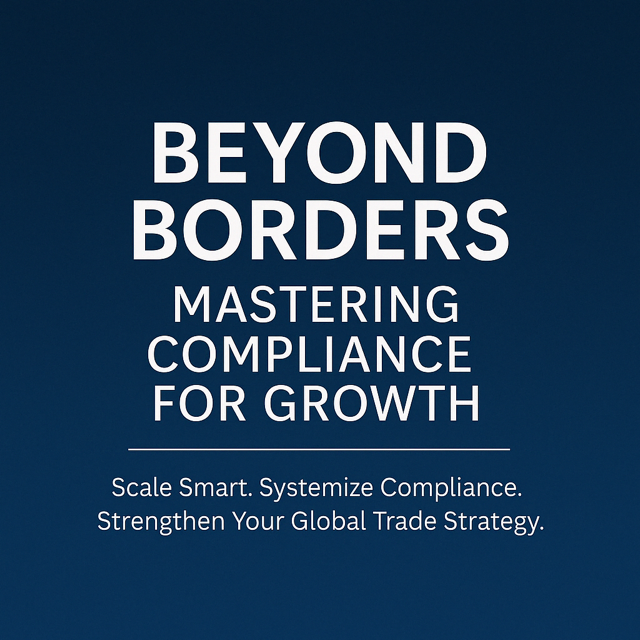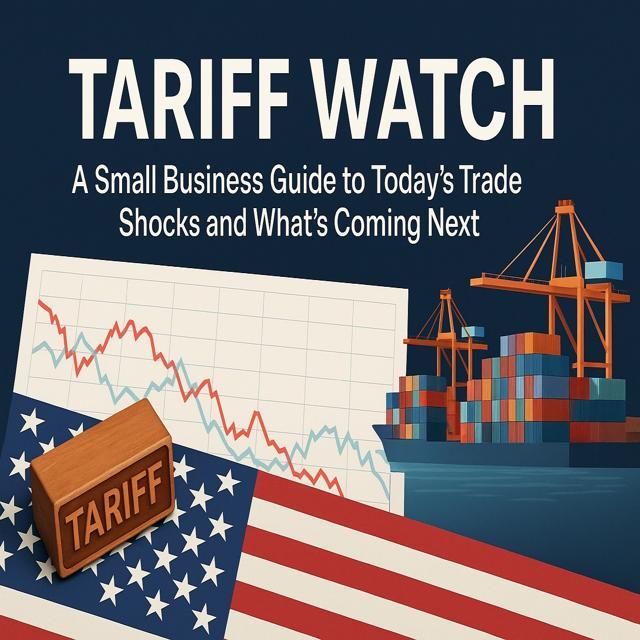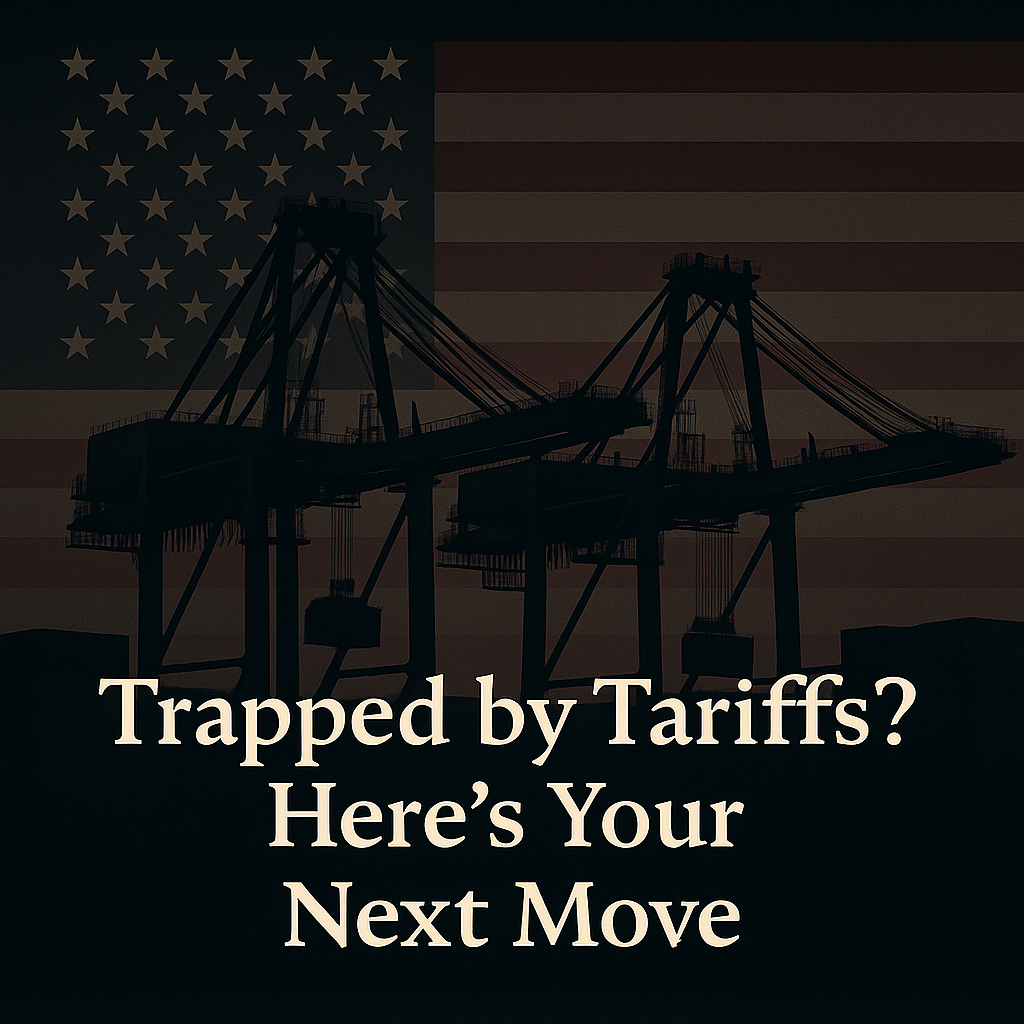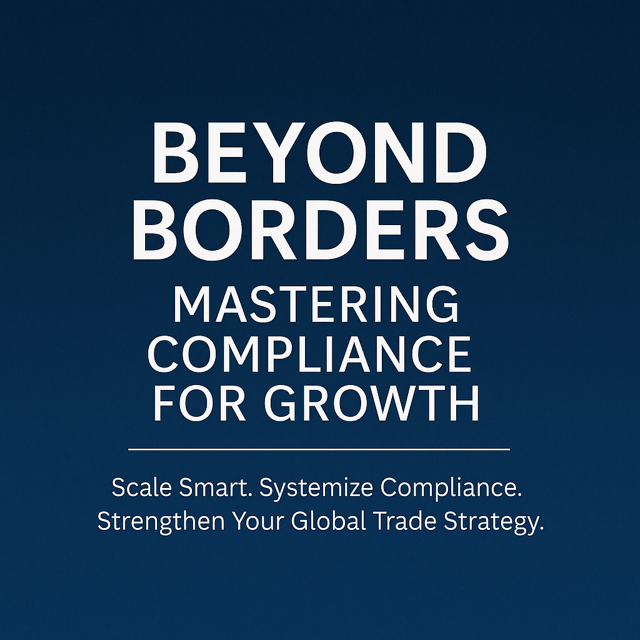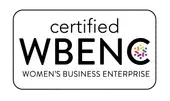Audio Conversation:
Full Blog Article:
When small businesses begin expanding into global markets, they often focus on new customers, competitive sourcing, and international growth. What is frequently overlooked is the steep learning curve of import and export compliance and the risks of getting it wrong.
Global trade isn’t just about shipping goods across borders, it’s about navigating a web of customs regulations, documentation rules, duty structures, and restricted party screening. For small and midsize businesses without a dedicated compliance team, staying compliant can feel overwhelming.
That’s where Global Trade Standard Operating Procedure (SOP) comes in. Think of it as your compliance playbook: a structured guide that documents how your business handles every step of global trade. From purchase order to final delivery, your SOP systematizes the process, minimizes risk, and sets your business up for scalable, sustainable growth.
In this article, we will break down why every small business needs a global trade SOP, how to create one, and how a customs and logistics partner can help you stay on track.
Why Compliance Needs a System
Every shipment that crosses a border is subject to scrutiny. Customs authorities want to know:
- What are you importing/exporting?
- From/to whom?
- At what value?
- Under what trade terms?
- Does it comply with all applicable regulations?
Failure to answer these questions clearly and consistently can trigger delays, penalties, or even seizures.
Having a documented Standard Operating Procedure allows your business to proactively manage these requirements by:
- Ensuring consistency across shipments
- Reducing errors and misclassifications
- Training new staff faster and more effectively
- Creating an audit-ready trail for compliance verification
Without an SOP, each shipment becomes a gamble, and the stakes only get higher as your volume grows.
Common Compliance Pitfalls for SMBs
Small and midsize businesses (SMBs) are particularly vulnerable to compliance risks because they often rely on ad hoc processes or external vendors without oversight. Here are some of the most common mistakes:
- Misclassifying Products
Using the wrong Harmonized System (HS) code can result in incorrect duties or non-compliance with regulatory requirements. "See Article 3 in our Unlocking Global Markets series for a deep dive on HS Codes". - Missing Documentation
A missing certificate of origin, pro forma invoice, or export declaration can delay a shipment or violate legal requirements. - Failure to Screen Customers and Vendors
Skipping denied parties screening could mean doing business with a restricted entity, an offense that can result in severe fines from the U.S. Department of Commerce or the Treasury. - Improper Valuation
Customs valuation errors can lead to overpayment or underpayment of duties and trigger audits.
See article 15, “ Valuation Methods,” for how to declare value properly. - No Recordkeeping System
U.S. regulations require that records related to imports and exports be kept for at least five years. Many SMBs are unaware of this.
What is a Global Trade SOP?
A Global Trade SOP is a written document that outlines step-by-step procedures for handling all import and export activities. It serves as your internal compliance framework.
Your SOP should address:
- Roles and Responsibilities: Who is in charge of trade compliance and who reviews documents?
- Supplier and Buyer Screening : How are partners vetted against restricted party lists?
- HS Code Classification: What is the process for assigning and verifying HS codes?
- Incoterms Management: How do you determine shipping terms and transfer of risk?
- Documentation Procedures: What documents are needed, and who prepares them?
- Valuation Guidelines: How is product value determined and documented?
- Trade Program Eligibility: Are you using any FTAs, Section 321 - De minimis , or TIBs?
- Recordkeeping Policies: Where and how are compliance documents stored?
A strong SOP acts as a blueprint for every transaction and a shield against costly mistakes.
Framework: Building Your Trade Compliance Playbook
Here’s a framework you can use to start building your global trade SOP today:
- Map Your Trade Process
Document your current workflows from order to delivery. Note who is responsible for what, which systems you use, and where decisions are made. - Identify Regulatory Touchpoints
Such as procurement, shipping, and receiving, identifying what compliance elements apply. This includes: HS Code Classification, Denied Party Screening, Country of Origin Labeling, Valuation, and Duties and Required Documentation - Establish Checklists and Templates
Standardize key steps using internal checklists and templates for commercial invoices, bills of lading, or USMCA certificates. This reduces human error and improves efficiency. - Assign Roles and Responsibilities
Clarify who owns each part of the process, from classification to recordkeeping. If you outsource to a broker or logistics partner, define who reviews their work and how they’re held accountable. - Implement a Recordkeeping System
Create a digital or hybrid filing system to store all trade-related records. Include timestamps, copies of communications, and a clear audit trail. - Schedule Regular Reviews
Your SOP should be reviewed at least annually, or when regulations or your operations change. Document updates with version control and training refreshers.
How a Customs and Freight Broker Can Help
You don’t have to create your SOP in isolation. U.S. customs brokers and freight forwarders can be valuable partners in setting up or refining your compliance playbook.
Here’s how:
- Classification Guidance: Brokers can help ensure accurate HS codes based on product specs and CBP rulings.
- Valuation Strategy: A broker can help you understand transaction value, assist, and deductions to stay compliant.
- Trade Program Eligibility: Brokers can identify when you qualify for programs like Section 321 or USMCA, saving you money.
- Document Preparation and Review: They ensure your documents meet regulatory standards before submission.
- Post-Entry Support: In the event of audits, brokers can assist with CBP responses, protests, and corrections.
Outsourcing the logistics and compliance management to an experienced partner allows you to focus on growing your business while staying compliant behind the scenes.
Summary: Why Every SMB Needs a Compliance Playbook
A well-crafted Global Trade SOP gives small businesses the structure and safeguards needed to operate confidently in global markets. Without one, you’re relying on luck and reactive problem-solving in a space that demands precision and accountability.
Key takeaways:
- Compliance risks are real and costly for small businesses entering global trade.
- An SOP provides a repeatable, documented process that minimizes errors and improves operational efficiency.
- Small businesses can begin building an SOP by mapping their trade process, identifying key regulatory steps, and standardizing documentation practices.
- Customs brokers and freight experts can help craft and maintain a robust SOP, ensuring your operations align with evolving regulations.
Frequently Asked Questions (FAQs)
Q1
: I’m a small business just starting to import, do I really need a full SOP?
A1 : Yes, even a simple SOP helps avoid costly compliance mistakes and ensures everyone follows the same process, especially as your team or shipments grow.
Q2 : What’s the most common compliance mistake for new exporters or importers?
A2 : Misclassifying products and failing to check denied parties lists. These issues can lead to shipment holds, fines, or worse.
Q3 : Can I outsource compliance if I don’t have internal expertise?
A3 : Absolutely, Many SMBs work with customs brokers, freight forwarders, and compliance consultants who help build and manage the SOP, ensuring compliance while you focus on sales and service.
🎧🎙️Want to hear more? Stay informed and inspired through two powerful channels:
- Borders & Bourbon - A Global Trade Podcast – Pour yourself a glass and join us for real talk on international trade. This show delivers solution-driven insights tailored for small businesses navigating the complexities of global markets. Available on all major streaming platforms.
- Global Trade Navigator - Prefer to read or listen to quick, practical tips? Explore more blog series articles like these or tune into the companion podcast on Spotify, where we break down each article to help you chart a smarter course through import/export compliance.
No matter your style, sip and listen, or scroll and learn, we’ve got your global trade journey covered.
References:
- U.S. Customs and Border Protection – Importing Into the United States. Link
- U.S. Export Regulations – Bureau of Industry and Security. Link
- U.S. CBP Recordkeeping Requirements. Link
- Consolidated Screening List (CSL) – U.S. International Trade Administration. Link
- Customs Broker Role in Compliance – National Customs Brokers & Forwarders Association of America (NCBFAA). Link
If you're curious to see how we can help, please visit our website
http://magneticprecision.com/. For inquiries and questions, contact us at
inquiries@magneticprecision.com.
Stay tuned for more insights as we continue our journey to mastering global trade compliance!

